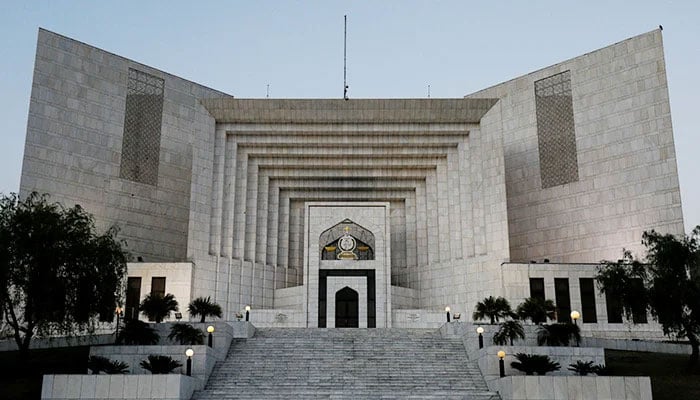Supreme Court bars cops’ transfer before specified time period
The top court restrained the authorities concerned from transferring police officials before completion of their stipulated time period mentioned in the law
ISLAMABAD: A three-member Supreme Court (SC) bench on Thursday restrained the authorities concerned from transferring police officials before completion of their stipulated time period mentioned in the law, and directed that if transfer of any police official was inevitable, reasons should be provided for it.
The bench, headed by Chief Justice of Pakistan (CJP) Umer Ata Bandial, and comprising Justice Athar Minallah and Justice Ayesha A Malik, heard the matter of political intervention in postings and transfers of Punjab Police officials.
The court directed the governments of Punjab and Khyber-Pakhtunkhwa (KP) to implement the Police Order 2002, and ordered that no police officer would be transferred without consulting the senior authorities concerned.
The court sought complete details from the governments of Punjab, Sindh, KP and Balochistan as well as the provincial police departments on postings and transfers of officials during the last 10 years.
The CJP suggested that in order to ensure good governance, the provinces of Sindh and Balochistan should also adopt the same formula of not transferring police officials before time.
CJP Umer Ata Bandial observed that due to political intervention in the Punjab Police, the First Information Report (FIR) of an assassination attempt on former prime minister Imran Khan was not registered, and the court had to intervene and issue orders in that regard.
“The apex court had to issue orders for lodging the FIR of assassination attempt on former prime minister as the case was not registered for several days. There is a perception that the governments use the police as a weapon,” the CJP observed, adding that as per law, the investigation cell should be separated from other section of the police.
“There should be a separate cadre of investigation police so that it could work independently and ensure professionalism,” the CJP remarked.
Bandial observed that there was a lack of investigative expertise in the police department, adding that weak evidence was being produced, which were benefiting the accused.
“If the police provide benefits to accused persons, then where will the victims go for relief,” the CJP remarked, adding that people were being affected due to an increase in crimes and lack of protection to people.
“Whether the Punjab government itself will abide by the law or the court should issue orders in this regard,” the chief justice remarked and asked the additional advocate general (AAG), Punjab, to seek instructions from the provincial government and inform the court.
The CJP further observed that the transfer of police officials should not be made on the directives of members of provincial assemblies (MPAs), adding that as per the law, CPO and DPO could not be removed before three-year time period, adding that it was the prerogative of the inspector general of police (IGP).
The AAG, Punjab, however, submitted before the court that postings and transfers of police officials were being made in consultations with the senior officials.
The CJP observed that in PK, incidents of killings were increasing, while murders of legal fraternity were also going up across the country.
The chief justice recalled that the court took notice of sufferings of people due to postings and transfers in the police departments due to political intervention, which was affecting the whole system.
The CJP noted that despite the court direction, the KP, Sindh and Balochistan governments did not file reports.
Meanwhile, the court adjourned further hearing until the second week of January next year.
-
 Netflix, Paramount Shares Surge Following Resolution Of Warner Bros Bidding War
Netflix, Paramount Shares Surge Following Resolution Of Warner Bros Bidding War -
 Bling Empire's Most Beloved Couple Parts Ways Months After Announcing Engagement
Bling Empire's Most Beloved Couple Parts Ways Months After Announcing Engagement -
 China-Canada Trade Breakthrough: Beijing Eases Agriculture Tariffs After Mark Carney Visit
China-Canada Trade Breakthrough: Beijing Eases Agriculture Tariffs After Mark Carney Visit -
 London To Host OpenAI’s Biggest International AI Research Hub
London To Host OpenAI’s Biggest International AI Research Hub -
 Elon Musk Slams Anthropic As ‘hater Of Western Civilization’ Over Pentagon AI Military Snub
Elon Musk Slams Anthropic As ‘hater Of Western Civilization’ Over Pentagon AI Military Snub -
 Walmart Chief Warns US Risks Falling Behind China In AI Training
Walmart Chief Warns US Risks Falling Behind China In AI Training -
 Wyatt Russell's Surprising Relationship With Kurt Russell Comes To Light
Wyatt Russell's Surprising Relationship With Kurt Russell Comes To Light -
 Elon Musk’s XAI Co-founder Toby Pohlen Steps Down After Three Years Amid IPO Push
Elon Musk’s XAI Co-founder Toby Pohlen Steps Down After Three Years Amid IPO Push -
 Is Human Mission To Mars Possible In 10 Years? Jared Isaacman Breaks It Down
Is Human Mission To Mars Possible In 10 Years? Jared Isaacman Breaks It Down -
 ‘Stranger Things’ Star Gaten Matarazzo Reveals How Cleidocranial Dysplasia Affected His Career
‘Stranger Things’ Star Gaten Matarazzo Reveals How Cleidocranial Dysplasia Affected His Career -
 Google, OpenAI Employees Call For Military AI Restrictions As Anthropic Rejects Pentagon Offer
Google, OpenAI Employees Call For Military AI Restrictions As Anthropic Rejects Pentagon Offer -
 Peter Frampton Details 'life-changing- Battle With Inclusion Body Myositis
Peter Frampton Details 'life-changing- Battle With Inclusion Body Myositis -
 Waymo And Tesla Cars Rely On Remote Human Operators, Not Just AI
Waymo And Tesla Cars Rely On Remote Human Operators, Not Just AI -
 AI And Nuclear War: 95 Percent Of Simulated Scenarios End In Escalation, Study Finds
AI And Nuclear War: 95 Percent Of Simulated Scenarios End In Escalation, Study Finds -
 David Hockney’s First English Landscape Painting Heads To Sotheby’s Auction; First Sale In Nearly 30 Years
David Hockney’s First English Landscape Painting Heads To Sotheby’s Auction; First Sale In Nearly 30 Years -
 How Does Sia Manage 'invisible Pain' From Ehlers-Danlos Syndrome
How Does Sia Manage 'invisible Pain' From Ehlers-Danlos Syndrome




